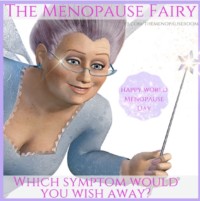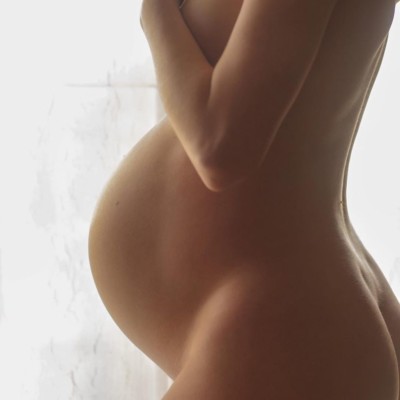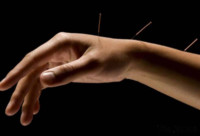Natural Woman, Natural Menopause
How Oriental Medicine Can Help You Cope With The Change
By Lucy Postolov, L.Ac.

“Going to Hollywood to talk about menopause
was a little bit like going to Las Vegas to sell savings accounts”
-Gail Sheehy (author of “The Silent Passage”)
Of all the wondrous miracles of our world, none is more miraculous than the
female body. It is to be appreciated, it is to be worshipped, and it is to be
amazed with its timely changes that occur throughout a woman’s life. One
change that is destined and brings a range of emotions from anxiety to
elation is menopause. The French say life begins at forty. Something else
is on its way as well.
River of Night Sweats! The Fire of Hot Flashes! Terror in the Ovaries!
No, these are not summer blockbusters coming to a theatre near you. In
reality, these are a few symptoms a woman can experience when the change is
at hand. Whoever said being a goddess was going to be easy.
Defining the Change
The Merck Manual of Medical Information defines menopause as the time in a
woman’s life when the cyclic function of the ovaries and menstrual periods
cease. Also known as “climacteric”, it is important to note that menopause is
not a disease but a normal physiological transition that indicates a phase in
a woman’s life where she makes the passage from a reproductive to a non-
reproductive state.
The basis for the decline of a woman’s reproductive power lies in the ovary
itself. The ovarian follicles are formed before birth in the fetus. At that
time they number approximately 6,000,000, decrease to 600,000 at birth, and
actually, number about 10,000 at the time of the menopause. Keeping this in
mind, it would be correct to say that menopause is not so much an event
that takes place suddenly in a woman’s life, but a natural, gradual
physiological process throughout her lifetime.
As ovaries age, response to pituitary-produced gonadotropins (follicle-
stimulating and luteinizing hormones) decreases, initially with shorter
follicular phases (hence, shorter cycles), fewer ovulation’s, decreased
progesterone production, and more cycle irregularity. Eventually, the
follicle fails to respond and, without feedback of estrogen, the circulating
gonadotropins rise substantially. Circulating levels of estrogen and
progesterone is greatly reduced.
Symptoms and Age of Occurrence
Essentially the symptoms of menopause usually occur between the ages of 48 and 55
with the median age being about 51. Remarkably, this has remained a
constant throughout the world and through the centuries. Chinese medicine
refers to cycles occurring in women at 7-year intervals and changes in men at
8-year intervals. Using these markers, the woman would begin her menstrual
cycle at 14 (2 x 7) and shows signs of menopause at age 49 (7 x 7). The same
formula can be used with the assumption that men mature at age 16 (2 x 8),
affirming the belief that men mature later in life. The symptoms of
menopause will vary in a woman depending on her lifestyle and dietary habits
to that point. As if you needed another reason not to smoke, smoking will
contribute to an early menopause.
Problems that a woman is likely to experience are: fatigue, headaches,
irritability, nervousness, vaginal dryness, night sweating, and the most
common of symptoms which is found in 75% of women, hot flushes or flashes. A
woman also may experience loss of bladder control, inflammation of the bladder
or vagina, and pain during intercourse.
Osteoporosis (severe deterioration of the bones) is a major health hazard of
menopause. Slender Caucasian women are at highest risk. Women who smoke
cigarettes, drink excessive amounts of alcohol, take corticosteroids, have a
low intake of calcium, or have a passive lifestyle are also at risk.
Cardiovascular disease progresses more rapidly after menopause, when estrogen
levels decrease.
Traditional Chinese Medicine View
To understand the Chinese philosophy and classifications of menopause,
we need to define the foundation that Chinese medicine is based upon, and that is the
concept of yin and yang.
The terms yin and yang are used by a traditional Chinese medicine
practitioner to describe the various opposing physical conditions of the
body. These terms stem from a basic Chinese concept describing the inter-
dependence and relationship of opposites. Much as hot cannot be understood or
defined without first having experienced cold, yin cannot exist without its
opposite yang, and yang cannot exist without yin. Together, the two
complementary poles form a whole. –Alternative Medicine, The Burton
Goldberg Group
Here are a few examples of Chinese diagnosis, patterns and clinical
manifestations of menopause:
1. Kidney-Yin deficiency. Dizziness, hot flush or flashes, night-sweating,
sore back, dry mouth, dry hair, itching, and constipation.
2. Kidney-Yang deficiency. Hot flushes but cold hands and feet, night-
sweating, pale face, depression, chilliness, backache, swelling of the ankles.
3. Kidneys and Heart not harmonized. Hot flushes, palpitations, insomnia,
Night sweating, blurred vision, dizziness, anxiety, backache, poor memory.
Chinese medicine does not refer to Kidney and Heart as a reference to an
organ, but to a channel of energy that flows through that organ. The Kidney
channel is responsible for reproductive and sexual activity, whereas the Heart
channel is responsible for the emotional and mental aspect of the body. Herbal
formulas will nourish the kidney essence; the acupuncture will regulate the
flow of Qi (vital energy). Research reveals that acupuncture stimulates
points that trigger the release of endorphins, natural analgesics found in
the spinal cord, brain, and pituitary gland.
Chinese Approach to Treatment and Prevention of Menopausal Symptoms
Chinese medicine can help a woman in this period of transition from
reproductive to a non-reproductive age in a gradual and healthy way. Herbal
treatment, acupuncture, meditation and a correct diet will help a woman with
menopausal problems. The treatment of a woman with oriental medicine will not
yield quick results, but will give a natural and balanced protection.
Chinese medicine with its gentle and safe manner will tonify Kidney essence
without side effects. Chinese medicine can be combined with HRT. There is no
contraindication of combining the two treatments because both work in
separate ways of treating menopausal problems and symptoms.
There are many different Chinese herbal formulas and acupuncture treatments
that will help the menopausal woman based on the diagnosis of the individual.
Each woman’s diagnosis is different and there is a combination of acupuncture
and herbal treatments suited just for her.
There are dietary recommendations that will ease and/or prevent the
menopausal symptoms and strengthen the Kidney essence, such as black beans,
sesame seeds, soybeans, walnuts, mulberries, yams, licorice, Chinese black dates,
lotus seeds and chrysanthemum flowers. Certain dairy foods contain the best
sources of calcium, notably milk, cheese, and yogurt. Certain seafood
(shrimps, oysters, canned sardines, and salmon with bones) and vegetables
(broccoli and parsley for example) also contain high quantities of this
Mineral. Kelp is one of the most calcium-rich plants available.
Daily meditation and proper rest are integral to the prevention of menopausal
symptoms. Lifestyle habits that will produce a severe transition include
stress, tension, overworking, smoking, excessive or lack of sexual activity,
stimulants and drugs.
Menopause is inevitable; there is no denying that fact. How a woman copes
with this period of her life is entirely in her hands and her trusted
practitioner. Embrace the wondrous changes that occur in all phases of your
 October is Breast Cancer Awareness month. My grandmother passed away from breast cancer at the age of 35 ( when my mom was only 3 month old) . My mom passed away from breast cancer at the age of 62….so now you can understand why 60 % of my practice is Breast Cancer Patients!! Why my mission in life is to fight for survival of these Women!!
October is Breast Cancer Awareness month. My grandmother passed away from breast cancer at the age of 35 ( when my mom was only 3 month old) . My mom passed away from breast cancer at the age of 62….so now you can understand why 60 % of my practice is Breast Cancer Patients!! Why my mission in life is to fight for survival of these Women!!
 SJ was referred to my practice for the 1st time in December 2018 by her
SJ was referred to my practice for the 1st time in December 2018 by her  “Going to Hollywood to talk about menopause
“Going to Hollywood to talk about menopause The Dao Masters believed that the key to a happy life is the balancing act of Yin and Yang within yourself. This individual balance centers you and makes it possible to strike a balance with another person ! What is Yin? It is a feminine, receiving, cooling, moistening-Moon Energy 🌙. What is Yang? It is male, proactive, giving, doing, achieving, warming, activating, initiating- the energy of the Sun 🌞! So….. we are all responsible for being centered and balanced within yourself and only then can we have happy and healthy sexual relationships with our partners 💥💫✨🔥 We are in a New Moon Phase of Lunar calendar right now, which is Yin. It requires the most Yin nourishment… herbal and acupuncture. Read about it in my chapter in the Textbook of Clinical Sexual Medicine published by Springer International in 2017 or please come to visit me or give me a call at 310-444-6212 to find more about it…🌔#moon #moonlight #yinyang #male #female #balance #sexualbalance #love #healthysexy #healingjourney #acupuncture #lucypostolov #waguihsiag
The Dao Masters believed that the key to a happy life is the balancing act of Yin and Yang within yourself. This individual balance centers you and makes it possible to strike a balance with another person ! What is Yin? It is a feminine, receiving, cooling, moistening-Moon Energy 🌙. What is Yang? It is male, proactive, giving, doing, achieving, warming, activating, initiating- the energy of the Sun 🌞! So….. we are all responsible for being centered and balanced within yourself and only then can we have happy and healthy sexual relationships with our partners 💥💫✨🔥 We are in a New Moon Phase of Lunar calendar right now, which is Yin. It requires the most Yin nourishment… herbal and acupuncture. Read about it in my chapter in the Textbook of Clinical Sexual Medicine published by Springer International in 2017 or please come to visit me or give me a call at 310-444-6212 to find more about it…🌔#moon #moonlight #yinyang #male #female #balance #sexualbalance #love #healthysexy #healingjourney #acupuncture #lucypostolov #waguihsiag